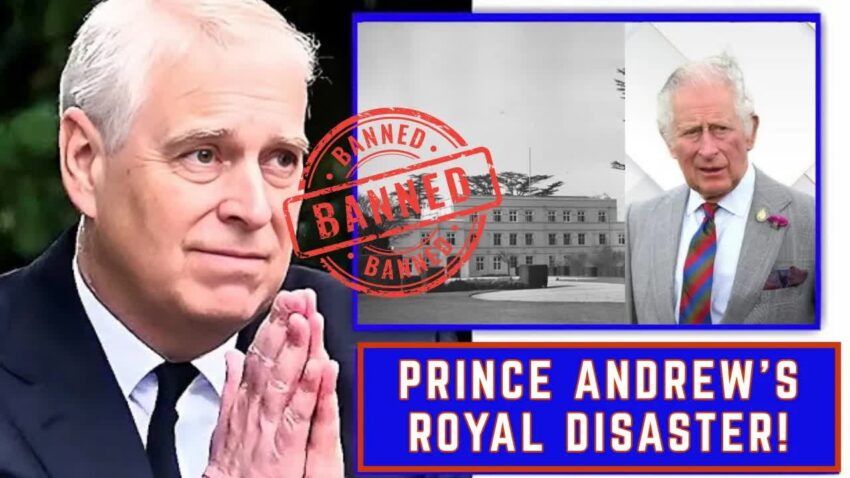In the latest twist of royal drama, Prince Andrew has reportedly received a significant financial boost, raising eyebrows and questions about the future of the Duke of York.
As he grapples with mounting debts and the loss of royal income, an anonymous benefactor has stepped into the fray, offering him a staggering annual subsidy of $3 million.
This unexpected lifeline comes at a time when Andrew is facing intense scrutiny over his financial dealings and public image.
The backdrop of this saga dates back to March 2023, when King Charles III suggested that Andrew vacate his lavish 30-room Royal Lodge in Windsor Great Park.
In exchange, the King offered him Frogmore Cottage, a property previously occupied by the Duke and Duchess of Sussex.
This move was part of Charles’s broader initiative to streamline royal expenses and ensure that residences align with the current needs of their occupants.
However, Andrew, now 63, has been reluctant to make the move, despite the financial pressures mounting from his brother’s decisions.
For over two decades, the Royal Lodge has represented Andrew’s former glory within the Royal Family.
Leaving this residence would be interpreted as an admission of his diminished status, something he seems unwilling to concede.
The introduction of an anonymous benefactor complicates matters further, as reports indicate that this individual is prepared to subsidize Andrew’s expenses significantly.
While this support may alleviate some of his immediate financial burdens, it inevitably raises questions about the long-term implications for both Andrew and the monarchy as a whole.
Royal commentator Bronte Coy recently weighed in on the situation, expressing uncertainty about the benefactor’s identity and intentions.
“While the source is legitimate, I don’t know what that means,” she stated, emphasizing the ambiguity surrounding the arrangement.
Coy speculated that though Andrew may have secured a temporary victory, the sustainability of this financial support remains uncertain.
Is this a battle won, but the war still raging?
Only time will tell.
Andrew’s financial troubles have drawn considerable public attention, particularly given the Royal Family’s historically secretive approach to money matters.
Once a working royal, Andrew’s income dramatically dwindled following his infamous 2019 BBC Newsnight interview, which aimed to clarify his ties to convicted s offender Jeffrey Epstein but instead resulted in his withdrawal from public life and a loss of royal privileges.
Previously, Andrew enjoyed an annual allowance of about £250,000 to carry out his official duties, but that income vanished along with his royal responsibilities.
This left him increasingly dependent on personal wealth and family support, a precarious position exacerbated by a substantial financial settlement in 2022 related to a civil sual assault case in the U.S.
The exact amount of the settlement remains undisclosed, but estimates suggest it could be between £7.5 million and £12 million.
Despite inheriting considerable sums from his late mother, Queen Elizabeth II, and grandmother, the Queen Mother, Andrew’s financial legacy has been marred by a series of questionable transactions.
For instance, in 2017, a $1.5 million personal loan linked to a wealthy Conservative Party donor raised eyebrows and concerns regarding his financial ethics.
One of Andrew’s most controversial financial moves was the 2007 sale of Sunning Hill Park, a mansion gifted to him and Sarah, Duchess of York, by the Queen.
Sold for $15.3 million above its asking price to a connection of Kazakhstan’s then-president, the transaction, facilitated through an offshore trust, attracted allegations of impropriety and further scrutiny into Andrew’s financial dealings.
Despite their divorce in 1996, Andrew and Sarah maintain a close relationship, with the Duchess publicly defending him amid controversies.
However, her own financial missteps, including accepting £15,000 from Epstein to settle a personal debt, have only added fuel to the fire of public criticism surrounding Andrew’s financial management.
The ongoing debates about royal finances are amplified by Andrew’s situation, highlighting the need for greater transparency within the monarchy.
Coy pointed out that the sources of Andrew’s income are often shrouded in mystery, raising pertinent questions about accountability in a modern context where public interest in royal expenditures is at an all-time high.
As Andrew navigates this complex web of financial challenges and royal expectations, the role of non-working royals like him comes under scrutiny.
The recent intervention of an anonymous benefactor could set a troubling precedent, suggesting that members of the Royal Family might rely on undisclosed funding, which undermines efforts for greater transparency.
For now, Andrew’s ability to remain in the Royal Lodge seems secure thanks to this newfound financial support.
Yet, the broader implications of his reliance on an unknown benefactor remain unresolved.
As the public watches this unfolding drama, the question lingers: will Andrew ever have to leave his beloved Royal Lodge for Frogmore Cottage?
The situation serves as a stark reminder of the challenges faced by the modern monarchy, especially as public expectations for accountability continue to rise.
With the precariousness of Andrew’s position firmly established, the future remains uncertain.
What do you think about this unfolding royal saga?
The story is far from over, and only time will reveal the next chapter in Prince Andrew’s tumultuous journey.
